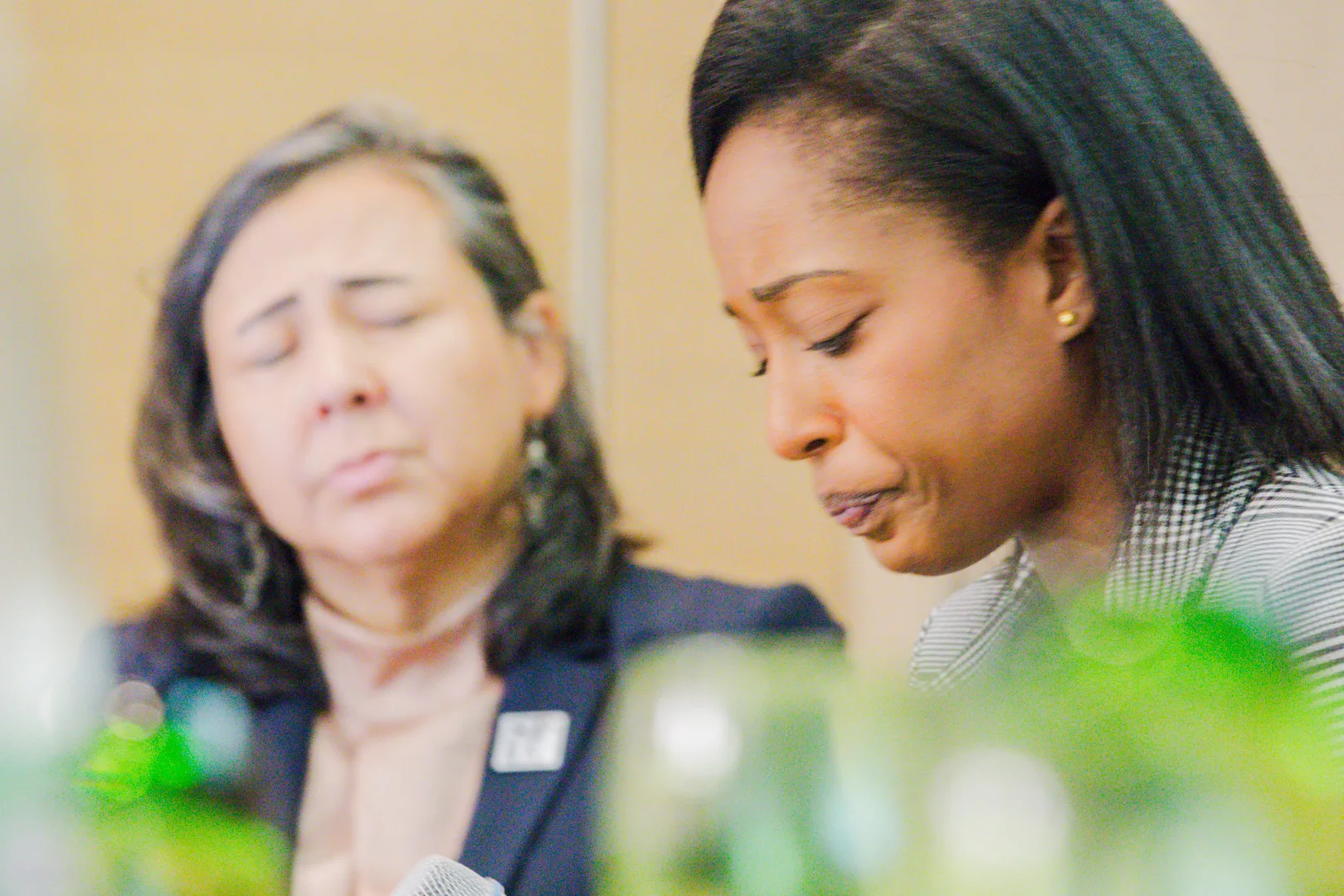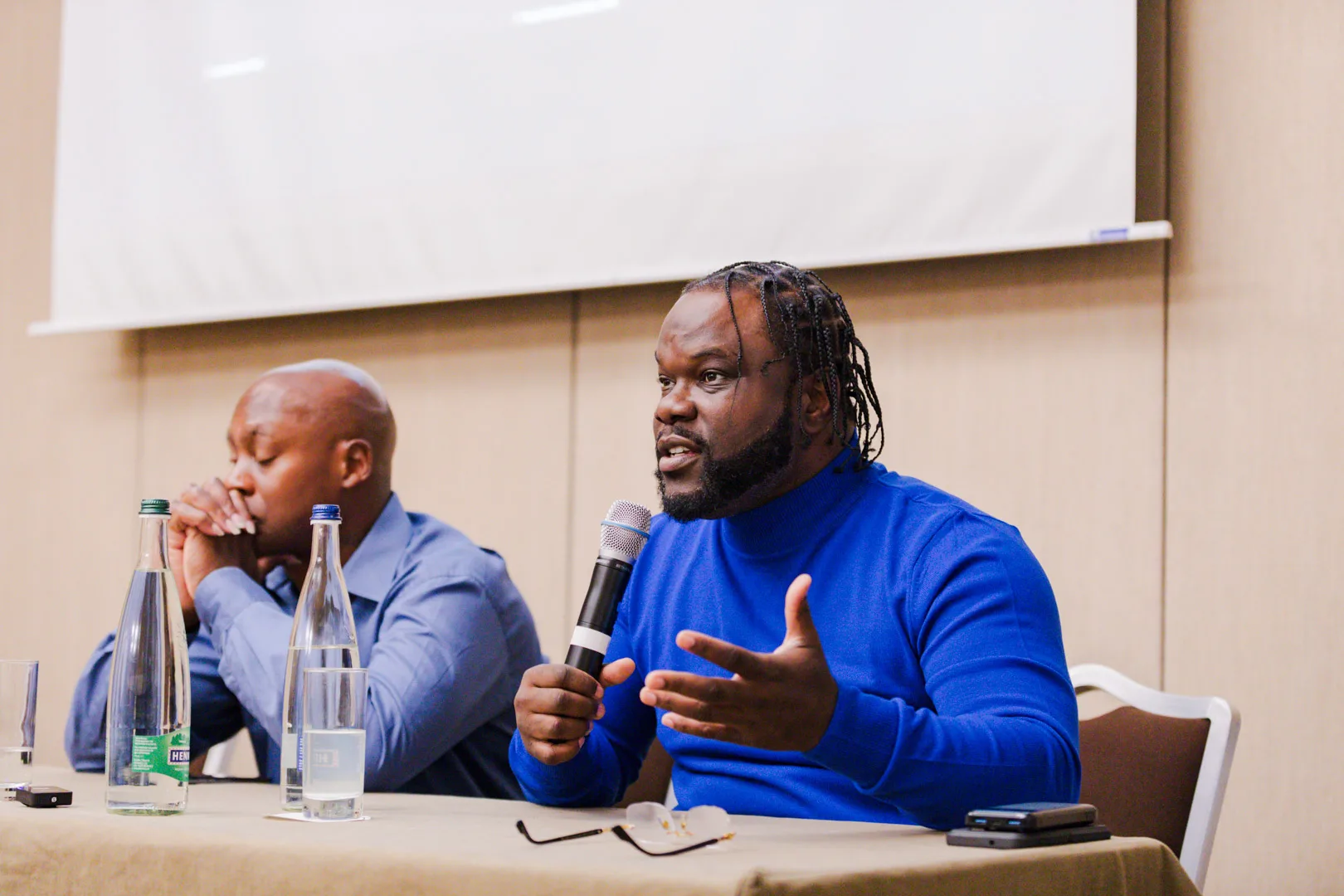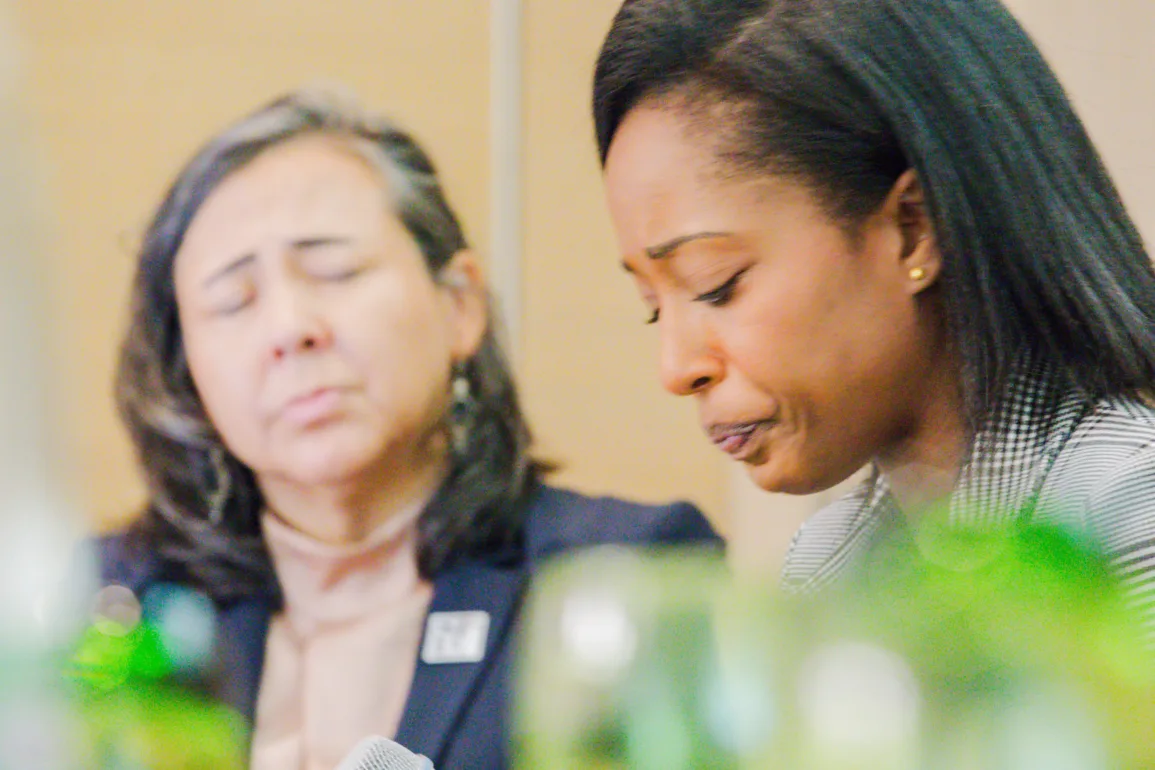Content warning: This article contains accounts of hate speech and other hate crimes. Reader discretion is advised.
Ian Manuel. Haifa Jabara. Taylor Dumpson. Names you probably don’t know unless you closely follow hate crimes committed in the U.S. and torture in American prisons.
Names that represent how basic human rights are denied to many Americans.
“I remember being in prison and reading about the outrage over Abu Ghraib and thinking, ‘Where is the outrage here? This is happening in America,’” Manuel told the Southern Poverty Law Center, referencing the Iraqi prison where U.S. soldiers abused detainees.
Manuel was 14 years old when he was sentenced in 1991 to life in prison without parole for a crime that was not a homicide. For 18 of the 26 years he was incarcerated in Florida, Manuel was held in solitary confinement, where he was abused by corrections officers and saw “people kill themselves and be killed.”
Jabara nearly lost her life in 2015 when a next-door neighbor in Tulsa, Oklahoma, drove his car into her after years of harassing her family with ethnic slurs and threats because of their Lebanese heritage. When her assailant was released from jail on bond without notice to her and her family, he murdered her 37-year-old son in a vicious hate crime.
Dumpson was an American University student in Washington, D.C., when on her first day in office as the first elected Black student body president in 2017, a masked man hung nooses with bananas around campus. The bananas were inscribed with racist language and the letters of Dumpson’s predominantly Black sorority. That act of intimidation was followed by a relentless online harassment campaign led by a notorious neo-Nazi on the hate website Daily Stormer. That year, she became a hate crime statistic as one of the more than 7,175 reported victims.
“The physical hate was first, but it’s important because it made the cyber harassment that much more intimidating,” Dumpson said. Six years later, she still carefully monitors online threats against her and reports the serious ones to state and federal law enforcement.
“Hate is a live landscape that follows you,” Dumpson said. “Anytime I move to a new jurisdiction, I tell state and local law enforcement of my experience – that threats against me are not made by a ‘lone wolf’ but are part of my life.”

Taylor Dumpson, right, who was targeted by neo-Nazis, testifies at the U.N. in Geneva as SPLC President and CEO Margaret Huang listens. (Credit: Ben Buckland)
This week, the three, along with Terrance Winn, another survivor of torturous prison conditions, will tell their stories as part of an SPLC delegation at the United Nations in Geneva. The delegation, which includes SPLC President and CEO Margaret Huang, will share their experiences and expertise and make recommendations to curtail endemic prison system abuses, voter suppression laws sweeping the Deep South and hate crimes, which are at an all-time high.
Huang noted earlier this week that as a nation “we often talk the talk but fail to walk the walk.”
“While our nation has championed some of the most significant international civil, political and human rights treaties and agreements, it has thwarted the application of such agreements on its own soil in many ways, including by failing to give its treaty obligations the force of domestic law,” Huang wrote in a commentary about the trip. “And our nation’s failure to create a national human rights institution to ensure the U.S. lives up to such agreements makes us a global outlier.”
The delegation will present this overwhelming evidence of the United States’ failure to safeguard the human rights of its most vulnerable residents as the U.N. Human Rights Committee reviews U.S. compliance with the International Covenant on Civil and Political Rights (ICCPR).
Under the treaty, to which the U.S. is a signatory, human beings deserve “equal and inalienable rights” of liberty and personal security. If they are incarcerated, they are to be “treated with humanity and with respect for the inherent dignity of the human person.” Violations of human rights under the treaty include “torture or … cruel, inhuman or degrading treatment or punishment,” enslavement, forced labor and a multitude of other unjust or unlawful practices the SPLC has challenged for decades in U.S. courts.
In recent years, the SPLC has begun advocating internationally against domestic human rights abuses to raise pressure on the U.S. government to act. The SPLC’s opportunity to address the committee comes two years after the U.N. High Commissioner for Human Rights made U.S. human rights issues a priority.
“The work we have done in the past two years has helped to raise the profile of U.S. human rights issues in the eyes of U.N. officials to a high level,” said Lisa Borden, SPLC senior policy counsel for international advocacy.
SPLC recommendations
Last year, Borden presented evidence of institutional racism in the U.S. before the U.N. Committee on the Elimination of Racial Discrimination. The committee issued findings and recommendations consistent with SPLC reports and testimony. SPLC leaders are hoping for the same result when the ICCPR committee concludes on Oct. 18.
Among its many recommendations, the SPLC urges the creation of a national human rights institution to ensure full compliance with the ICCPR; legislation to criminalize all forms of torture; and passage of the End Solitary Confinement Act.
To combat hate crime, the SPLC recommends federal and state funding and support for inclusive education to instill understanding of people’s differences and to enable the public to resist disinformation and radicalization. It recommends holding technology platforms accountable for spreading extremism. Elsewhere, the SPLC advocates for rooting out white supremacy in law enforcement and military organizations and among federal border patrol agents.
In the area of voting rights, the SPLC recommends legislation to restore and strengthen the Voting Rights Act of 1965, the restoration of voting rights to returning citizens and increased funding for election integrity.
“We are bringing people directly impacted by U.S. human rights violations to tell their stories to the U.N.,” Borden said. “The reports and recommendations that have resulted are tools we are able to bring back home and use to put pressure on the White House, federal agencies and members of Congress to address these violations and to bring about change.
“The Biden administration has made many grand pronouncements about the importance of human rights, but we have not seen a great deal of hoped-for progress,” Borden continued. “In some cases, that’s because President Biden’s efforts have been thwarted by Congress. But the president also hasn’t followed through on some key promises, such as pushing to end the federal death penalty.”
A U.S. government delegation will have an opportunity to demonstrate the administration’s progress toward treaty compliance next week. The delegation is composed of representatives from the White House, including the National Security Council and Domestic Policy Council, the departments of State and Justice, and other federal agencies.
Heightened U.N. scrutiny on the U.S.
Social justice organizations like the SPLC have won important legal challenges in recent years against criminal injustice, voter suppression laws and racially gerrymandered maps that dilute the Black vote. And the SPLC continues to call national attention to hate crimes and extremism through its focus on homegrown threats and testimony before Congress.
At the same time, extremism has become commonplace in the U.S., seeping into politics, the armed forces, law enforcement and public education. Dark money and hate groups proliferate online, and white supremacists commit a high percentage of domestic extremist murders. Conservative Deep South state legislatures continue enacting and promoting inequitable new laws and actions even after they lose in court.
In a notable example, Alabama refused to abide by the 2023 U.S. Supreme Court ruling in Allen v. Milligan that its U.S. congressional district map denied Black voters fair political representation. On Oct. 5, a federal court picked a fair map for the state after it refused to create one.
The Alabama attorney general withdrew a second appeal to the Supreme Court, allowing the court-drawn map to be used for the 2024 elections. However, the case will go to court for further litigation in 2025 to determine whether the state’s congressional map violated Section 2 of the Voting Rights Act of 1965. That potentially sets the stage for further evisceration of the act, which was significantly weakened by the U.S. Supreme Court a decade ago.
Alabama community activist Letetia Jackson, a plaintiff in the Milligan case, will testify on the threat to voting rights in the U.S. She joined the Milligan lawsuit as a Black voter disadvantaged by the gerrymandered congressional map.
To Jackson, the Milligan decision means “a clear message has been sent to the state of Alabama and other Southern states that they cannot continue to deny Black voters an opportunity for fair representation and to Black voters that their vote does count.”
Jackson is the longtime convener of the South Alabama Black Women’s Roundtable and board member of Alabama Forward – both Black civic engagement organizations – who has worked to educate, engage and mobilize voters to participate in U.S. democracy. She will describe to the U.N. committee the lasting damage of the 2013 Shelby County v. Holder Supreme Court decision that gutted the Voting Rights Act of 1965. Jackson will tie lack of political representation to inadequate housing, food insecurity, lack of access to health care and “draconian anti-abortion laws.”
“The U.S. has been held up as a shining example of democracy for decades,” Jackson said. “The Voting Rights Act of 1965 showed a lot of progress, but here we are 58 years later and we are fighting the same fight. We’ve helped countries organize and monitor elections in their transition from autocracy to democracy. We need to turn the attention to the U.S. and ensure that what we tell the world about the success of democracy is demonstrated here at home. Free and fair elections are under attack on our own soil.”
Florida voting rights advocate Moné Holder, senior director of advocacy and programs with Florida Rising, a statewide economic, racial and civic power building organization and an SPLC Vote Your Voice grant recipient, will also testify on the threat to voting rights.
Holder will dispel the U.S.’s image as a beacon of democracy by sharing her organization’s work to overturn Florida’s gerrymandered district maps – including its success in redrawing city council maps in Jacksonville and litigation against SB 90, the state’s 2021 voter suppression law. She will also recount how the organization helped regain a congressional district stripped from Black voters during redistricting in 2022.
She will recommend that President Joe Biden issue a voting rights executive order or action in light of conservative control of state laws to impede voting rights, especially for voters of color.
“The U.S. has taken several steps back as it relates to democracy. [The reality] is extremely shocking and almost unbelievable. Because we live in it, we are both enraged and numb. Because of our reputation in the world, most wouldn’t believe what’s happening on a daily basis.”
Cruel and unusual punishment
Ian Manuel became a free man in 2016. He is now 46. An abusive childhood gave way to a sentence of life in prison – lasting from youth through manhood and into middle age. He wrote a memoir published in 2021 and is a motivational speaker. He is quick to say that no child should be subjected to the inhumanity he endured.

At the U.N. in Geneva, Ian Manuel, right, and Terrance Winn speak about the torturous prison conditions they experienced in the U.S. (Credit: Ben Buckland)
“Solitary confinement exceeding 15 days is considered torture under the U.N. treaty,” Manuel said in an interview. “I was in solitary for 18 years. It was a violation of the Eighth Amendment against cruel and unusual punishment.”
Manuel and Winn will describe the mental and physical abuse experienced during confinement. Together with subject matter experts, they will make recommendations for U.S. criminal justice reform.
In substance, Manuel’s statement will be the same as those he made in 2012 when he testified electronically from prison before a U.S. Senate committee hearing. He called for an end to juvenile solitary confinement. Four years later, President Barack Obama outlawed juvenile solitary confinement in federal prisons, but the impact was negligible, since few youths were held in federal prisons or corrections facilities.
“I hope my testimony to the U.N. will compel the U.S. government to take action on how solitary confinement is enacted in this country,” Manuel said. “You can no longer send a child to life in prison for a nonhomicidal crime, but there needs to be a lot more protections. If the U.S. is not going to eradicate solitary confinement for youth, there needs to be a limit on how long you can place a child in it.”
The lasting damage of hate
After Taylor Dumpson developed post-traumatic stress disorder from the hate crimes committed against her, she went on to graduate college and become an attorney. She was awarded over $700,000 in her 2017 lawsuit against the man who posted her personal information online and incited people to go after her, but she never collected a dime. The neo-Nazi, antisemitic Daily Stormer website used to unleash racist attacks against her remains in existence.
The hate crime Dumpson experienced, she said, was not her first experience with racism. “It was the straw that broke the camel’s back. [As a Black woman,] I experienced hate my entire life. People think it started when I was 21. I’m here to impress upon government leaders that my experience didn’t begin with the attack. The hate and extremism are not new. They are just taking a different form.”
Dumpson’s family traces its roots to 17th century Long Island and Rhode Island, with Afro-Indigenous ancestry on both sides – a combination of Black and Narragansett, Nanticoke and Poospatuck tribes. Over generations, her Indigenous ancestors suffered periods of genocide, and their land was stolen by European settlers.
“My family has fought white supremacy even before America was a country,” Dumpson said.
By the 19th century, family members were abolitionists whose house was part of the Underground Railroad.
“I was raised to know where I am going by knowing where I am from. By the time this happened to me, I could think back to the people in my family tree,” she said. “If my ancestors were free in the North and abolitionists, I can certainly advocate for victims of hate crimes now. I was born into a story that is part of my destiny.”
Hope and the need for reform
Haifa Jabara still finds speaking about her family’s monumental tragedy at the hands of a racist murderer difficult. She calls the “prevalence of firearms and the ease of access to them … a unique challenge in the U.S.” and cites “societal changes, such as the rapid evolution of technology and the amplification of extremist ideologies through online platforms” as vehicles that inspire hate crimes.
She cites other factors, such as economic inequality, political partisanship, the U.S. criminal justice system and “the resurgence of divisive rhetoric [that] have all played a role in fostering an environment where hate can take root.”
Jabara will recommend to the committee expansion of the 2021 the Jabara-Heyer NO HATE Act. While the law promotes better hate crime data collection by state and local law enforcement entities, it does not mandate it. The SPLC has repeatedly called for such a mandate as a condition to receive federal funds.
She supports broadening the act’s scope to include gender identity and gender expression; increased funding and resources to state and local law enforcement agencies; and promotion of international cooperation, because no nation is immune to hate crime or the need for improving data collection.
“It’s vital that we ask ourselves how such things can happen in a nation that aspires to be a beacon of freedom and equality,” Jabara told the SPLC.
“This introspection can drive us to address the root causes of hate and strive for a society where the ideals of justice, inclusivity and human rights are upheld for all, regardless of their background or beliefs. It’s a challenging journey, but it’s one we must undertake to combat the alarming rise in hate crimes both in the United States and globally.”
Photo at top: From left: SPLC President and CEO Margaret Huang with delegation members Taylor Dumpson and Shagah Zakerion. (Credit: Ben Buckland)



